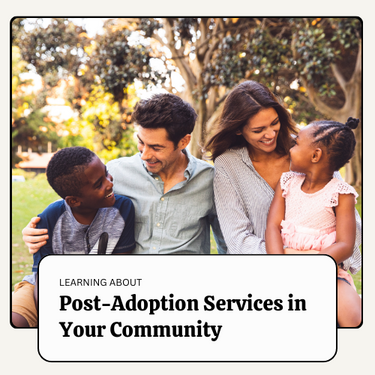
Post-adoption services are any form of support adoptive families receive after adoption placement. Therapeutic, trauma-informed, post-adoption support services are highly beneficial both immediately following adoption placement and on an ongoing basis. The primary post-adoption service providers are adoption-competent therapists, social workers, and case managers, and the most common post-adoption services include adoption therapy, adoptive family case management, adoptive parent training, adoptive family coaching, adoptive parents or family retreats, adoption camps, adoption community groups, and therapeutic respite care.
Why are post-adoption services important?
Adoption services are extremely important for the healthy integration of the adoptee within the adoptive family, the personal and cultural identity development of the child, and the trauma informed awareness of the adoptive guardians. Positive post-adoption functioning is largely dependent on having a plan in place that supports the high rate of emotional needs and potential behavioral challenges that are commonly experienced with children who have suffered from trauma related to separation from family of origin, child abuse, neglect, institutionalization, and abandonment.
The reality is that most of the approximately 118,000 foster children in the United States are in the foster care system as the result of abuse and/or neglect. There is an abundant amount of research that has documented those children in foster care are disproportionately higher at risk for developmental delays, chronic health conditions, educational learning difficulties, and severe mental health concerns. Due to the impact of Adverse Childhood Experiences (ACE), many children waiting for adoption have specific mental health, psychological, physical, and developmental needs that are critical to address for their own wellbeing and also for the stability of the family adopting them.
The good news is that post-traumatic growth greatly reduces the risks caused by Adverse Childhood Experiences and is achievable through post-adoption support services. Research has shown that when a child from foster care is adopted into a family that is trauma-informed and has a therapeutic, support system in place, their chances of success greatly increase. Consistent inclusion of post-adoption resources and support services are known for reducing the adoptee’s risk of mental health problems, substance abuse, teen pregnancy, homelessness, and incarceration.
Professional post-adoption support services matter to both the adoptive family and the adopted child, and the strong relationship between trauma-informed adoption support services and positive adoption outcomes should not be underestimated.
Do I need post-adoption services?
If you are or plan to be an adoptive parent, then the simple and short answer is: YES!
However, unfortunately, many families seeking adoption tend to think that “everything will be fine” post-adoption, “with enough love” and then they struggle to find helpful services when crisis occurs. Learning and implementing trauma-informed parenting methodologies is an ongoing process, starting before placement. Although it’s never too late to ask for help, parents who plan to adopt should consider securing long-term, ongoing post-adoption services by creating a post-adoption plan BEFORE placement. Post-adoption services help ensure positive filial integration of the adoptee, prevent placement disruption, and provide mental health support for the potential risks associated with any adverse child experiences that might have occurred pre-adoption.
Who provides post-adoption services?
Typically, non-profit agencies with expertise in adoption provide many of the most common post-adoption services, but many other post-adoption services exist such as an adoption-competent therapist (a therapist trained in adoption specific issues) or in-person and online adoption community support groups, and individual providers, such as coaches, specifically trained in trauma-informed parenting. When it comes to mental health and psychological well-being, proactive and preventative measures are always best.
If an adoption is coordinated through the U.S. foster care system, then it’s important to be aware that some states provide post-adoption services at no cost, however qualifications, services, and funding vary by state. If an adoption is coordinated through a private agency, or as an international adoption, then little on-going post-adoption financial support is typically provided, and families are encouraged to have a plan in place to pay for what they will need. If an adoption occurs internationally, or was a private infant adoption, then some post-adoption support services such as talk therapy, play therapy, or family therapy may be covered by insurance, however other services such as case management will likely not be covered.
Again, this can’t be emphasized enough, parents considering adoption are urged to research available support options within their community and have a plan in place prior to adoption when there is less activity and more time available.
Post adoption resources
Check out our resource lists for adoptive parents, including podcasts, suggested reading for adoptees, and even adoption-friendly movies.
Find post-adoption services
Visit KIDSTherapyFinder.com and search our directory to find an adoption-competent services for you and your child today.

Sign up for our newsletter to get instant access to parenting resources sent directly in your inbox!
